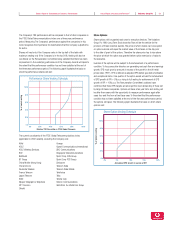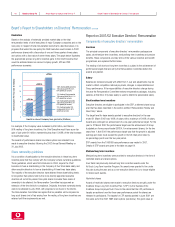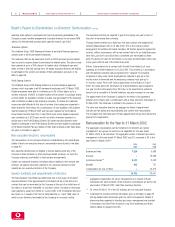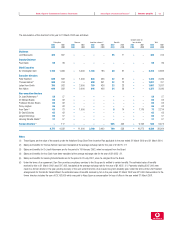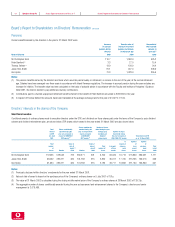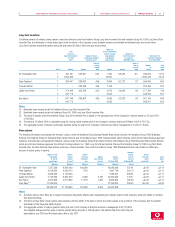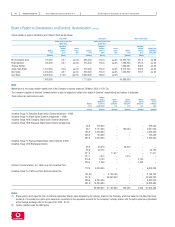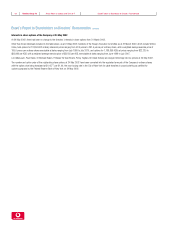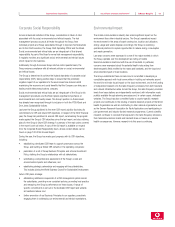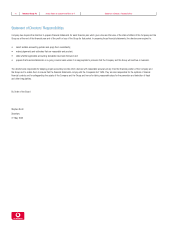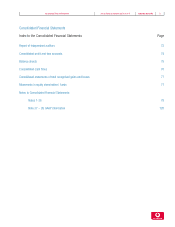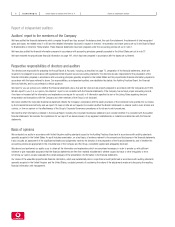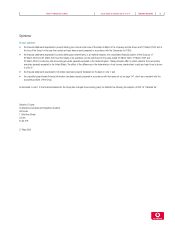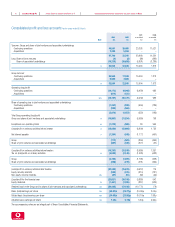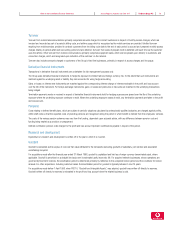Vodafone 2002 Annual Report Download - page 71
Download and view the complete annual report
Please find page 71 of the 2002 Vodafone annual report below. You can navigate through the pages in the report by either clicking on the pages listed below, or by using the keyword search tool below to find specific information within the annual report.
Corporate Social Responsibility Vodafone Group Plc 69Annual Report & Accounts and Form 20-F
Corporate Social Responsibility Environmental Impact
Across all business activities of the Group, consideration is taken of risks
associated with its social, environmental and ethical impacts. The risk
management process occurs at all levels throughout the Group, from
individual projects and Group subsidiaries through to regional chief executives
and to the Chief Executive, the Group Chief Operating Officer and the Board.
Social, environmental and ethical risks are an integral part of that shared
responsibility. As part of the Board’s normal risk management responsibility,
it regularly monitors any significant social, environmental and ethical issues
which impact on the business.
Additionally, through the annual Group internal control questionnaire, the
Group ensures compliance with all relevant policies on social, environmental
and ethical issues.
The Group is determined to achieve the highest standards of corporate social
responsibility (CSR), taking positive steps to ensure that the potentially
negative impact of our operations to the environment are reduced whilst
maximising the economic and social benefits that the Company can bring as a
leading mobile telecommunications company.
Social, environmental and ethical risks are an integral part of the Group’s risk
management procedures and the Board places significant importance on
environmental and community issues. The Group’s position on these issues
has already been recognised through its inclusion in both the FTSE4Good and
Dow Jones Sustainability indices.
Last year the Group published its first ever CSR report, publicly disclosing its
commitments to CSR and future CSR objectives. In respect of the 2002 financial
year, the Group has published its second CSR report, summarising the progress
made against the Group’s CSR objectives since the last report, and also outlining
plans for the Group’s future CSR strategy. A summary of the main points covered
in the report is set out below. A copy of the full report is available on request
from the Corporate Social Responsibility team, whose contact details can be
found on page 148 of this Annual Report.
During the year, the Group has made good progress with its CSR objectives,
including:
•establishing a dedicated CSR team to support governance across the
Group, and building a Global CSR network in the operating companies;
•publication of a set of Group Business Principles and a Social Investment
Policy, defining the Group’s relationships with all stakeholders;
•undertaking a comprehensive assessment of the Group’s social and
environmental impacts and influences; and
•
establishing strategic partnerships and engaging with key stakeholders.
This includes joining the World Business Council for Sustainable Development.
Future CSR plans envisage:
•establishing additional components of a CSR management system across
the subsidiaries, providing more consistent policies, promoting best practice
and measuring the Group’s performance on these issues. A range of
specific commitments is set out in the dedicated CSR report and website,
as mentioned above; and
• further promotion of our Business Principles to our suppliers, proactively
engaging them in addressing our environmental and ethical expectations.
The mobile communications industry has a less significant impact on the
environment than other industrial sectors. The Group’s operations impact
the environment in the areas of asset construction, location and utilisation,
energy usage and waste disposal. Accordingly, the Group is examining
operational practices to explore opportunities to reduce energy consumption
and waste generation.
Last year, concerns were expressed in some of the major markets in which
the Group operates over the development and siting of mobile
telecommunications masts and with the use of handsets. In particular,
concerns were expressed about the potential health risks arising from
electromagnetic fields emitted by the masts and handsets, and the visual and
environmental impact of mast locations.
The Group understands these concerns and is committed to developing a
consultative approach with local communities in building out networks around
the world to minimise visual impact on the local environment, and to the funding
of independent research into the radio frequency emissions from both handsets
and network infrastructure alike. Across the Group, the radio frequency emission
levels from base stations are independently monitored, with information made
publicly available through planning processes and, in certain cases, dedicated
websites. The Group has also committed funds to country-specific research
projects and contributes to the funding of several research projects of the World
Health Organisation as well as contributing to other national organisations such
as the German Research Association for Radio Applications and participating in
joint government and industry funded research programmes. Current scientific
research continues to conclude that exposure to the radio frequency emissions
from telecommunications masts and handsets does not cause any adverse
health consequences. However, research into this area is continuing.


